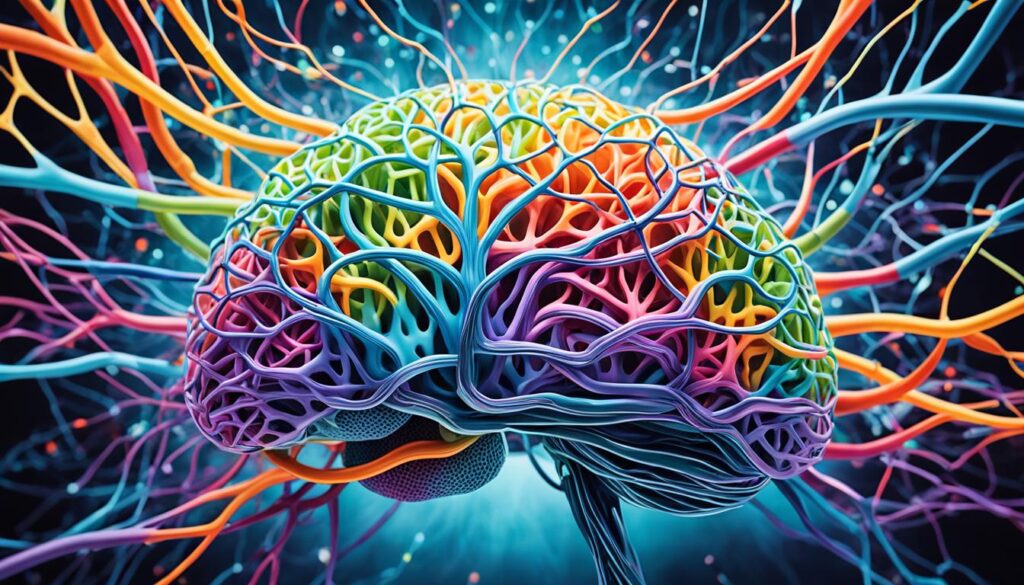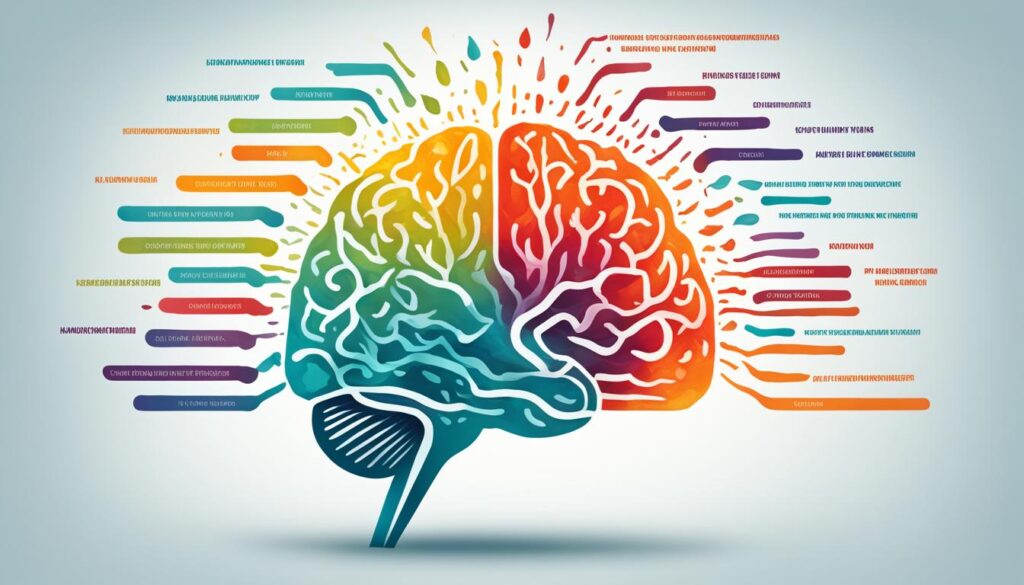Imagine waking up every day feeling sharp and focused. Your brain works at its best, making daily challenges easier to manage. This isn’t just a wishful thought. With intermittent fasting, enhancing your brain health becomes possible.
Intermittent fasting switches between times of eating and not eating. Many people try it for physical benefits and weight loss. But, it also offers big pluses for your brain.
This article will show you how intermittent fasting is great for the brain. You will learn about its positive effects on thinking and concentration. Discover how intermittent fasting can change your brain for the better.
Ready to see how intermittent fasting affects your brain? Let’s start exploring this exciting link.
Key Takeaways:
- Intermittent fasting offers surprising benefits for brain health.
- It enhances cognitive function and improves focus.
- Biohacking your body through fasting can boost brain health.
- Intermittent fasting is a revolutionary practice that alternates periods of fasting and eating.
- By incorporating intermittent fasting into your lifestyle, you can unlock the potential for better brain health.
Deciphering Intermittent Fasting: A Brain-Boosting Phenomenon
Intermittent fasting has become quite popular lately. It’s known for helping people manage their weight and for boosting brain health. By learning about intermittent fasting, how it leads to ketosis, and its effects on the brain and neurotransmitters, you can really tap into its benefits.
The Fundamental Principles of Intermittent Fasting
Intermittent fasting includes cycles of eating and not eating. You might fast for 16 hours and eat in an 8-hour period, eat and fast on alternate days, or eat usually for 5 days and limit calories for 2 days. This way of eating triggers changes in the body that go way beyond just losing weight.
The Metabolic Shift to Ketosis and Its Impact on Brain Health
When you fast, your body runs out of glucose for energy and starts burning stored fat instead. This leads to the creation of ketones in the liver, which the body can use for fuel. Being in this state, called ketosis, is really good for the brain.
Neurotransmitters and Intermittent Fasting: Balancing the Brain’s Chemistry
Neurotransmitters in the brain help control your mood, thinking, and how your brain works overall. Intermittent fasting can change the levels of these neurotransmitters. For instance, it can lead to more BDNF, a protein that helps neurons grow and improves how the brain works.
| Neurotransmitter | Role | Effect of Intermittent Fasting |
|---|---|---|
| Dopamine | Regulates motivation, reward, and pleasure | Intermittent fasting increases dopamine levels, promoting enhanced focus and motivation. |
| Serotonin | Regulates mood, appetite, and sleep | Intermittent fasting enhances serotonin production, leading to improved mood and mental well-being. |
| Gamma-Aminobutyric Acid (GABA) | Inhibitory neurotransmitter, regulates anxiety | Intermittent fasting increases GABA levels, reducing anxiety and promoting relaxation. |
Intermittent fasting makes a big difference in the brain by adjusting neurotransmitter levels. This can greatly improve how the brain functions and our mental health.
Here’s 5 Surprising Ways Intermittent Fasting Boosts Brain Health
1. Neuroplasticity and Fasting: Rewiring the Brain for Enhanced Focus
Neuroplasticity is the brain’s ability to change and reorganize. It does this by making new neural connections based on our experiences. This ability shapes how we think and act.
Intermittent fasting can boost this brain power, improving focus and brain function. During 12 to 16 hours of not eating, our brains start to change. They produce important chemicals that help make these new connections.
When we fast, our brain makes the most of limited energy. It does so by starting processes that make our brain cells work better. One key process increases BDNF, a chemical that helps brain cells grow and stay healthy. BDNF is vital for learning and memory.
“Intermittent fasting promotes neuroplasticity by increasing the production of key growth factors, such as BDNF, that support the growth and maintenance of neurons.”
Intermittent fasting also turns on genes that keep our brain healthy. Research shows fasting boosts genes that help our brain cells connect and protect themselves. This helps our brain work better.
One important benefit of fasting is autophagy. This process cleans out damaged cell parts, making our brain cells work more efficiently. This leads to better focus and thinking abilities.
In summary, intermittent fasting is a powerful way to enhance our brain’s functions. It promotes growth, supports cell health, and cleans out cell waste. This all contributes to better focus and mental skills.

2. Intermittent Fasting: A Gateway to Cellular Renewal and Mental Clarity
Intermittent fasting goes beyond just weight loss. It’s key for cell renewal and clearer thinking. When we fast, our bodies start cleaning out old cells. This is great for our brains.
When you don’t eat for a while, your body gets rid of old, unnecessary cells. This process cleans up our brain and gets rid of toxins. With a cleaner brain, we think more clearly.
Intermittent fasting also helps our brain grow stronger. It releases proteins that make brain cells healthier. This means we can think better and remember more.
By fasting, our brains produce more BDNF, a special protein. BDNF helps us learn and stay in a good mood. It makes our brain healthier and our thoughts clearer.

Intermittent fasting makes our brains work better and think clearer. By adding it to your life, you open up your mind’s full power.
3. The Connection Between Intermittent Fasting and Reduced Inflammation
Intermittent fasting is popular for its potential to help with weight loss and boost overall health. Researchers have found a link between it and lower body inflammation. This kind of inflammation is the body’s way to protect against harm and sickness. But, too much inflammation for too long can hurt various parts of the body, including the brain.

Fasting’s Effect on the Gut-Brain Axis and Immune Response
The gut-brain axis is a two-way communication line between your gut and brain. Studies show that intermittent fasting can improve this communication, leading to less inflammation. When fasting, the body cleanses itself of damaged cells and toxins through autophagy. This cleanup directly benefits the gut’s microbes, which are key to a healthy immune system and keeping inflammation in check.
During fasting, our bodies also make ketones by breaking down fat. Ketones can reduce inflammation and regulate the immune response. So, by enhancing immune function and reducing inflammation, intermittent fasting helps the gut-brain connection. This reduction lowers the chance of brain inflammation.
Combatting Neuroinflammation through Strategic Eating Cycles
Neuroinflammation happens when the brain and nervous system become inflamed. If it goes on for too long, it can lead to serious diseases like Alzheimer’s and Parkinson’s. Intermittent fasting can act as a strategy against such brain inflammation by decreasing overall body inflammation.
Its controlled eating patterns help manage the immune system and keep brain inflammation at bay. Fasting triggers cell repair and renewal, which betters brain health and functionality. This drop in inflammation is crucial for protecting the brain from diseases and supporting clear thinking.
4. Unlocking the Anti-Aging and Neuroprotective Benefits of Intermittent Fasting
Intermittent fasting does more than help you lose weight. It has amazing benefits for your brain and can fight aging. By fasting at times, your brain can become healthier and stronger.
Fasting as a Tool for Longevity: Preserving Cognitive Health
Intermittent fasting helps you live longer and keep your mind sharp. Research says it boosts brain health and fights off diseases that come with aging.
While fasting, your body uses fat for energy. This change helps your brain work better. It releases ketones, which protect and fuel your brain cells.
Fasting reduces harmful stress on your brain. This slowdown in stress helps avoid diseases like Alzheimer’s and Parkinson’s. Fasting also cleans out bad proteins and waste from brain cells, keeping them healthy.
Nourishing the Brain: Fasting-Induced Growth Factor Increases
Intermittent fasting increases growth factors that help the brain. These factors, like BDNF, support brain cells’ growth and survival.
When you fast, your body makes more BDNF to deal with less energy. This boost helps improve memory and protects the brain from aging.
The image shows how intermittent fasting protects the brain. It’s key for keeping your mind sharp as you age.
In short, intermittent fasting is great for your brain. It helps you live longer, keeps your mind sharp, and feeds your brain during fasts. It’s a strong ally for staying mentally fit.
5. Intermittent Fasting as a Lifestyle: Realizing Your Brain Health Potential
Intermittent fasting is more than a trend; it’s a lifestyle for better brain health. By making it part of your daily life, you can improve your mind and overall health. It’s important to tailor your fasting plan to fit your own needs and goals.
Creating a Sustainable Intermittent Fasting Schedule
Finding a fasting schedule that fits your life is key. Think about your daily activities and when you prefer to eat. Try to fast and eat at the same times every day to help your body’s clock.
You could try fasting for 16 hours and eating in an 8-hour window, or fasting every other day. Pick a method that fits with your life and lets you eat healthy while fasting.
Personalizing Your Intermittent Fasting Approach for Optimal Results
Intermittent fasting isn’t one-size-fits-all. Your age, how active you are, and health conditions matter when picking your fasting plan. Some might do well with short fasts; others might need longer ones.
Listen to your body and change your plan as needed. Remember to drink plenty of water and eat nutritious food when you’re not fasting. This supports your brain and overall health.
Intermittent fasting works differently for everyone. Choose a plan that suits your lifestyle and preferences. This way, you can get the most out of intermittent fasting for your brain.
Conclusion
Intermittent fasting can greatly improve your brain health and focus. This article showed how it boosts your brain’s health. It helps you stay sharp and attentive.
Intermittent fasting helps rewire your brain, enhancing cognitive skills. When fasting, your body enters ketosis, refreshing your cells. This leads to better mental clarity and brain performance.
It also reduces inflammation, which is good for your brain and immune system. Planning your meals can help fight brain inflammation. This supports your brain’s health.
Intermittent fasting is a lifestyle, not a quick solution. Find a fasting routine that fits your life. Tailor it to meet your unique needs and goals. Using intermittent fasting as a biohacking tool can boost your brain function and health.




Leave a Reply